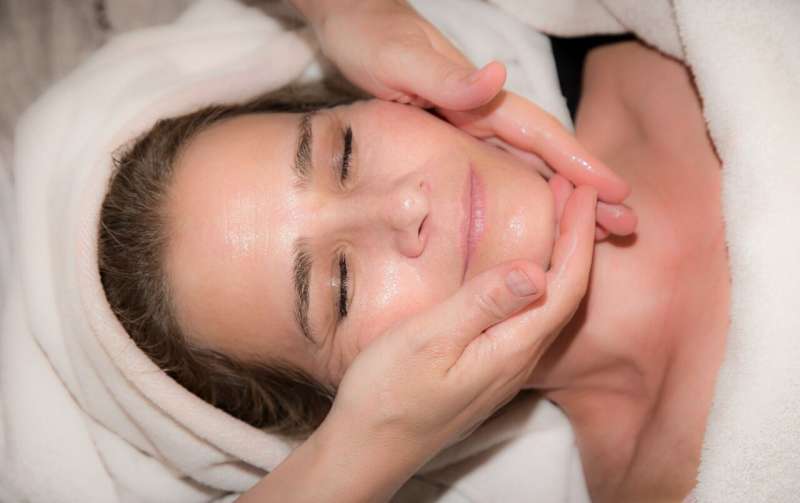
Credit: Pixabay/CC0 Public Domain
One of the few certainties in life is the wrinkling of our skin.
The “anti-aging” industry was worth almost £56 billion globally in 2023 —and is forecast to grow. But, although we can attempt to disguise the visible signs of aging through tweakments such as reducing exposure to sun and cosmetics, biological aging cannot be reversed.
One of the latest social media trends is fascial massage of the face to combat wrinkles and other signs of aging. Fascia is thin connective tissue made of collagen, which envelops muscles, bone and organs of the body.
Influencers promoting fascial massage claim that massaging the face’s fascia can produce some astonishing results, including significant changes to facial features and skin quality.
The face and the hands are among the most exposed parts of the body and often the first places to show signs of aging. As we get older, our skin’s ability to generate collagen—the primary building block of the body’s skin, muscles and bones that makes skin smooth and strong—reduces. Additionally, the sun’s UV rays penetrate the skin, damaging collagen proteins and cells and further reducing the skin’s strength—as well as promoting wrinkles and tumor formation.
So is fascial massage the secret to smoother, tighter, more lifted skin and facial features?
Fascial massage aims to lengthen protein molecules and their ability to stretch, releasing pressure from fascia attached to muscles, where it may be trapped or trapping nerves, causing pain or limiting movement. Fascial massage, for instance, is often used on the back to reduce stiffness and increase movement, typically done by someone with a working knowledge of the fascial system. But there’s a growing self-care trend for fascial massage of the body, using aids such as foam rollers—and massaging the face hoping to change its appearance.
New faces?
I hate to be the bearer of bad news but there’s no scientific evidence to suggest that fascial massage affects the shape or tissues of the face.
From the age of about 30, the body begins to remodel other collagen containing tissues such as the bones and fat of the face, as well as muscles, which changes the angles of the bones of the face—these changes tend to be more pronounced in women. The upper jaw—the maxilla—undergoes the most significant shift, changing cheek structure, which loses volume and prominence. For instance, the cheekbone protrudes at its peak level up to the age of 30—but then recedes.
The changes in bony structure may be small—only a few millimeters—but they can loosen the skin’s supporting connective tissues causing wrinkles and sagging.
As if that isn’t enough, the layers of fat between the deep fascia on top of the bone and the superficial fascia under skin atrophy as we age, reducing volume and exacerbating the appearance of wrinkles and sagging. Often the first visible evidence of these changes is appearance of jowls on the lower jaw.
Some social media influencers have claimed that fascial massaging of the face can make cheekbones more prominent, even in younger people, and nix jowls. But massaging the fascial skin’s fascia could actually exacerbate wrinkling.
Fascial massaging breaks down the structure of collagen as well as stretching it to work out any “knots.” This results in a longer connective tissue protein that has more flexibility, which that may contribute to wrinkling rather than reducing it.
Massaging also targets the fibroblasts, the cells that make collagen, by mechanically stimulating to produce more collagen to help support the overlying skin. Studies have shown that fibroblasts have to work harder as they age, when they produce less collagen and have contact with fewer collagen proteins. It’s unlikely, then, that massaging can reverse the aging of fibroblasts to stimulate the skin’s collagen production.
Social media videos promoting fascial massaging of the face also claim they can banish excess fluid through lymphatic drainage, giving a leaner, more chiseled appearance by reducing volume. This seems to contradict the aims of many anti-aging products on the market—and popular tweakments, such as hyaluronic acid dermal fillers—which claim to make the skin look more youthful by adding volume to appear taut and full.
For those people hoping to maintain a youthful look, the most effective approach is to invest in a high-factor sunscreen, drink plenty of water and maintain a healthy diet, a combination far more likely to protect collagen than fascial massage.
This article is republished from The Conversation under a Creative Commons license. Read the original article.![]()
Citation:
The latest anti-aging trend is massaging the skin’s fascia—here’s what you need to know (2024, August 18)
retrieved 26 August 2024
from https://medicalxpress.com/news/2024-08-latest-anti-aging-trend-massaging.html
This document is subject to copyright. Apart from any fair dealing for the purpose of private study or research, no
part may be reproduced without the written permission. The content is provided for information purposes only.
Note: This article have been indexed to our site. We do not claim legitimacy, ownership or copyright of any of the content above. To see the article at original source Click Here












